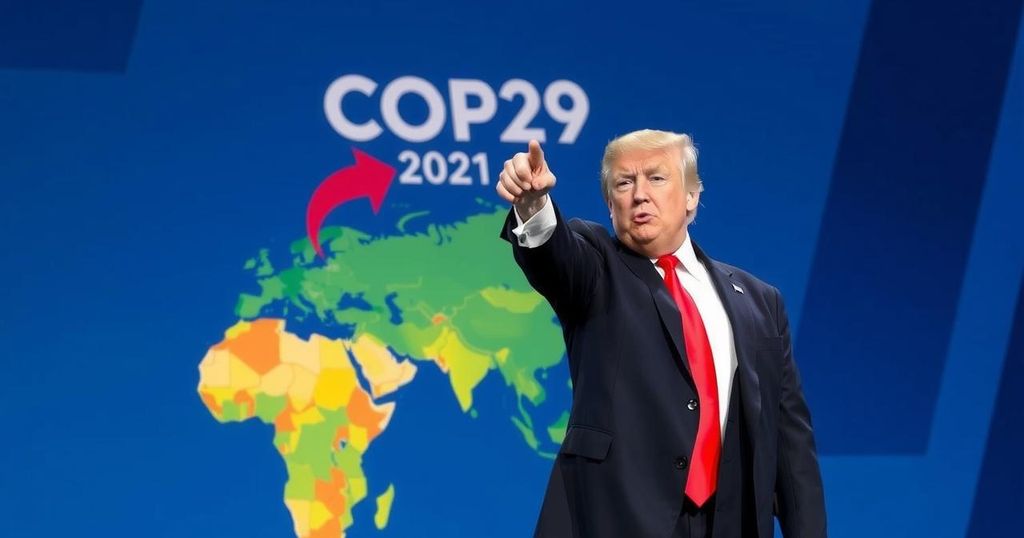Donald Trump’s electoral victory creates uncertainty for COP29 climate summit, impacting the potential for robust climate agreements. Concerns arise regarding U.S. withdrawal from the Paris Agreement, necessitating increased leadership from Europe and China. Local U.S. governments aim to continue climate commitments, demonstrating the complexity of global climate negotiations moving forward.
Donald Trump’s recent election win is causing significant concern among international partners ahead of the COP29 climate summit, scheduled for November 11-22 in Baku, Azerbaijan. With Trump expressing intentions to withdraw the United States from the Paris Agreement, apprehensions rise regarding the potential for a constructive global climate deal. Climate negotiators assert that the absence of U.S. participation may severely undermine discussions on climate finance, prompting Europe and China to assume greater leadership responsibilities. The anticipated weakening of U.S. climate policy has raised alarms among negotiators aiming to enhance international climate commitments. Various nations had envisioned working with the U.S. to pressure major contributors, including China and wealthier Gulf states, to make more substantial investments in UN climate funds. However, without U.S. backing, achieving ambitious climate financing will be increasingly difficult, which could dissuade developing countries from engaging seriously with Western climate objectives. Furthermore, numerous climate experts emphasize resilience among global renewable energy investments, despite the challenge posed by Trump’s presidency. The ongoing momentum towards clean energy is expected to persist regardless, suggested by insights from leadership in Latin America and Germany. While uncertainties loom over the U.S. role in climate action, the European Union and China are encouraged to reinforce their alliance to maintain momentum for international climate efforts. In light of the political shifts, U.S. state and municipal leaders seek to fill the void left by federal inaction, demonstrating ongoing commitment to Paris Agreement goals. The U.S. Climate Alliance and affiliated organizations are forming delegations for COP29, representing a significant portion of the U.S. population and economic might. Their involvement underscores a growing grassroots commitment to sustainability, despite federal challenges to climate policy adherence.
The article addresses concerns regarding the impact of Donald Trump’s recent electoral win on the global climate agenda, particularly as it relates to the upcoming COP29 summit. The narrative reflects the fear among global negotiators that the U.S. withdrawal from the Paris Agreement could jeopardize international cooperation efforts needed for effective climate action. It sets the stage for discussions about the necessity for other world powers, specifically Germany and China, to step into leadership roles in climate dialogues and initiatives. The background also highlights the importance of climate finance in supporting disadvantaged nations while underscoring the role that U.S. states and cities may play in sustained climate efforts despite federal policy shifts. Overall, it encapsulates the critical dynamics expected to unfold at COP29 in the context of U.S. political developments.
In conclusion, Donald Trump’s election raises significant concerns for the COP29 climate summit, potentially diminishing the prospects for a robust international climate agreement. The necessity for Europe and China to assume greater amounts of leadership in climate negotiations becomes apparent as Trump indicates plans to withdraw the U.S. from critical agreements. Nevertheless, local governments in America are poised to exhibit a commitment to climate action, suggesting that progress may persist, albeit amidst broader challenges. Therefore, international efforts for climate resilience remain imperative, underscoring a shared responsibility among global leaders.
Original Source: www.swissinfo.ch






